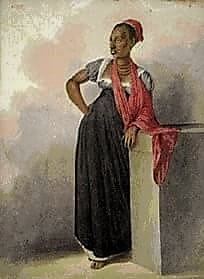Haiti is known to have a very rich history, especially being the first black nation to gain independence. One of the most celebrated women in Haitian Independence is Adbaraya Toya. She is more popular in Haiti by the name Victoria Montou, a named she was given when she arrived in Haiti as a slave from Africa.
Sources have it that Adbaraya was a native of Dahomey which is the present-day Benin Republic in West Africa. According to these sources, she used to be a soldier, healer, and member of the women council of Dahomey Kingdom. Her position in the Dahomey Kingdom makes it evident that she was one of the Dahomey Amazons known as N’Nonmiton. Their job was to fight and protect the Kingdom of Dahomey.

It is safe to say that Adbaraya was abducted during one of the wars she fought in and sold to Haiti where she became a slave. Her masters gave her the name Victoria, which is more evidence of her roots as part of the Dahomey Amazon. In Haiti, her base was the Cormier Sugar Plantation where she became close pals with Marie Elisabeth. Elisabeth was the mother of Jean Jacques Dessalines who would later lead the Haitian revolution.

Jean’s mother handed him over to Adbaraya before her death which made a major impact on his future as a soldier. It is said that she taught Jean how to defend himself, fight one-on-one combat, throw a knife, in fact, all he needed to know about being a soldier. During her free time, she used her healing abilities to care for wounded slaves on her plantation.
Through her training, Jean Jacques Dessalines was able to join the slave rebellion of 1791 and become a major force to fight in the revolution. As soon as she gained her freedom through the rebellion, Adbaraya set up her own army and trained them. She led them to fight along Dessalines in the Haiti revolution even though she was advanced in age at the time.

After the revolution in which she was wounded, she stayed in Dessalines house where she was cared for till she died in 1805. A State Funeral was held to honor her and she has been celebrated since then as the Mother of Haitian Independence.
See also:
